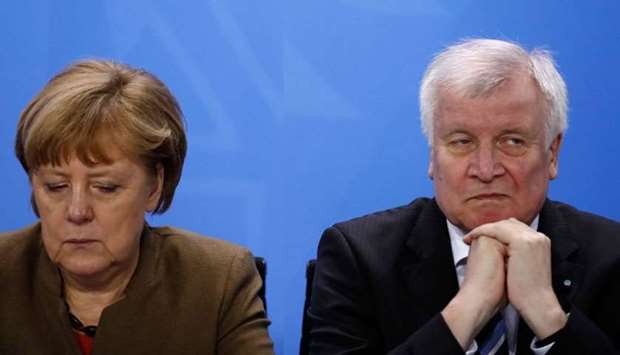German Chancellor Angela Merkel's ruling coalition faced an uncertain future Monday, as her hardline conservative Bavarian allies vowed a final attempt at a deal on migrant policy after she was unmoved by her interior minister's offer to resign.
‘I said that I would vacate both my offices (as federal interior minister and CSU party chief) in the next three days,’ Horst Seehofer told reporters in Munich.
Before that deadline runs out, he would speak with Merkel's CDU Monday afternoon ‘in hopes of reaching an understanding’ that would shape his decision on whether to stay on he added.
At a closed-door meeting with fellow party chiefs, Seehofer had earlier complained he had ‘no support’ after failing to convince Merkel of his plan to turn away asylum seekers registered in other European countries.
But other party bosses refused to accept his departure and kept strategy talks going until the early hours.
With Seehofer now making his political future dependent on the outcome of the talks, questions linger about the future of Merkel's governing coalition between the CDU-CSU alliance and the centre-left Social Democratic Party (SPD).
If Merkel holds firm and he does quit, the CSU could offer a replacement interior minister if it aims to remain tied to her party.
Alternatively it could break up the two parties' decades-long partnership, depriving Merkel of her majority in parliament and pitching Germany into uncharted political waters.
To politically survive, Merkel could attempt a minority government, seek a new coalition partner in the ecologist Greens or pro-business Free Democrats, or orchestrate a no-confidence vote in parliament that could trigger new elections.
Apparently unafraid of the risks, the CDU on Sunday offered its sister party no outstretched hand in the fight over a European approach versus unilateral national measures to slash migrant numbers.
CDU general secretary Annegret Kramp-Karrenbauer said in Berlin party leaders were ‘united’ behind ‘effective, humane solutions together with our European partners’.
- 'Secondary migration' -
After the Bavarians' relentless pressure on Merkel, European leaders on Friday agreed new measures to reduce immigration and so-called ‘secondary migration’ of asylum-seekers between countries.
Merkel, who has been in office since 2005, warned last week the issue of migration could decide the future of the EU.
Leaders said they would consider setting up ‘disembarkation platforms’ outside the EU, most likely in North Africa, in a bid to discourage migrants and refugees boarding EU-bound smuggler boats.
Member countries could also create processing centres to sort economic migrants from refugees.
At the national level, Merkel also proposed that migrants arriving in Germany who first registered in another EU country should be placed in special ‘admissions centres’ under restrictive conditions.
A document she sent to the CSU and SPD also outlined deals with 16 other countries to return already-registered migrants if they reached Germany.
Sources said Seehofer rejected Merkel's assessment that the EU-wide measures would ‘have the same effect’ as his demand to turn away at the border asylum-seekers already registered in other EU nations.
That left him with only three options.
He could defy her orders by ordering border police to carry out his plan, which would force her to fire him and almost certainly break up the CDU-CSU alliance, or he could accept a humiliating climbdown or resign.
As the CDU and CSU parties hunkered down in Berlin and Munich, leaders on both sides sought to clarify what was at stake.
‘It's not about who comes out on top, but about what's right,’ Bavarian state premier Markus Soeder told the CSU gathering, according to news agency DPA.
Meanwhile for Merkel's troops, ‘the image of the country, our ability to act and our ability to govern’ were on the line, said economy minister and close Merkel ally Peter Altmaier.
- 'Merkel-bashing' -
The chancellor's EU push was ultimately prompted by the CSU's fear of losing its cherished absolute majority in Bavaria's state parliament.
The ‘Union’ of CDU and CSU fused the southern state's beer-and-lederhosen-infused conservatism with more moderate politics, forming a centre-right force that dominated Germany for decades.
Political stability was upset by Merkel's 2015 decision to keep borders open to migrants and refugees arriving from the Middle East via the Balkans, Hungary and Austria.
Since then, more than one million people have arrived in Germany, while Merkel's governments have repeatedly tightened immigration and asylum laws.
Nevertheless, the anti-refugee, anti-Islam Alternative for Germany (AfD) surged into federal parliament for the first time last year, leading to months of paralysis while Merkel struggled to put together a workable coalition.
Opinion polls point to the AfD making a similar entrance to Bavaria's regional parliament in October.
Weeks of ‘Merkel-bashing’, however, have failed to help the CSU, as a Forsa poll last week showed around 68 percent of Bavarians backed Merkel's quest for a Europe-wide answer to migration rather than Germany going it alone.

